‘Disaster relief solutions in Asia’ was in focus as Business Sweden and the Embassy of Sweden, Bangkok, arranged a private sector partnership workshop and matchmaking event on 1 December 2015.
Supported by the UN Office for the Coordination of Humanitarian Affairs (OCHA) ’Working with business to strengthen disaster preparedness and response in Thailand and Asia-Pacific’ was in focus as a delegation of Swedish SMEs offering a wide range of niche products attended.
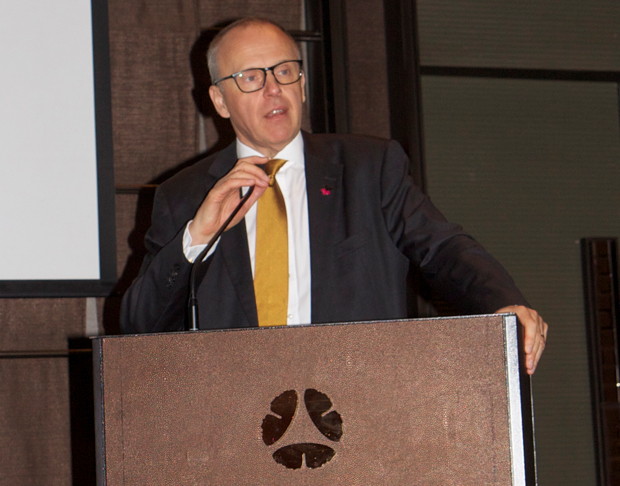
The workshop was part of the delegation’s visit to Thailand and the Philippines – countries identified by Sweden in “great need” of such solutions for assistance. Both countries are currently working on improving the level of preparedness and resilience to disasters, contributing to the delegation’s relevance.
Thailand is each year affected by floods of different proportions and its proximity to earthquake zones also makes it exposed. Philippines are hit by many storms annually.
The workshop was an opportunity for the business delegation and these agencies to meet and learn from each other how collaborations and procurement opportunities can materialize, based on where the Swedish products can match with specific needs.
Bangkok is also the Asia Pacific hub and centre for decision-making for many UN Agencies and programmes, enabling-relationship building on a strategic Asian level.
Multilateral development organizations and local relief organizations attended the workshop, which was opened by Sweden’s Ambassador to Thailand, Mr Staffan Herrström.
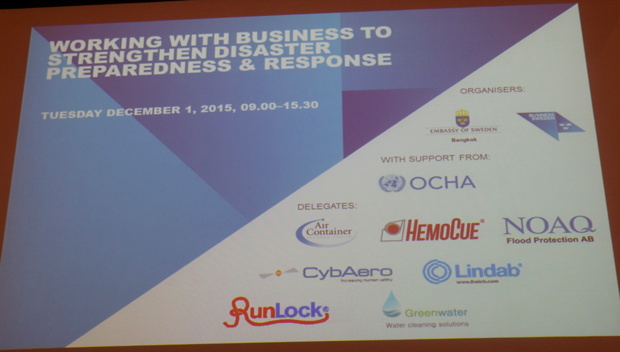
Global humanitarian needs are at record levels and the number of people forcibly displaced by conflict or persecution is at its highest since the Second World War. Sweden is one of the world’s leading humanitarian donors working to promote an effective and principles-based humanitarian system that is capable of coming to the aid of the world’s most vulnerable, wherever disaster strikes. Over the past decade Sweden has been the fourth largest government provider of humanitarian assistance (approximately USD 5.2 billion.) Of the country’s entire development assistance, one third of Swedish aid is channelled through UN funds and programmes.
With that Sweden is a deeply engaged, staunch supporter of the UN and so Ambassador Herrström began by highlighting that humanitarian and development assistance is “in our DNA”.
“We care. Also our products and solutions have proven track record,” said the Ambassador and pointed to the participating delegation as Swedish SMEs that reflect the entrepreneurial spirit in Sweden.
He continued to highlight how greatly Thailand had responded to the 2004 tsunami and how this has resulted in the warning system that Sweden as a partner contributed to being realized.
“Against this background it is natural to continue within disaster response, where one way is to make use of knowledge, and capacity from the private sector via private sector partnerships.”
He also invited the participants to opportunities for private sector collaborations within SIDA’s regional cooperation and welcomed ideas for that.
Then Mr Markus Werne, Head of the OCHA Regional Office for Asia and the Pacific followed, who pointed out the critical importance of strong partnerships.
Humanitarian responses are stretched worldwide and will continue to be so and there is thus a big need to find new resources, he said, as only 20 per cent goes to natural disasters; the rest to conflict zones.
“The impact of natural disasters will rise,” he predicted, where partnership rather than sponsorship should be in focus. Both expertise and funds are needed, where the goal is to be able to have a well-coordinated response to disasters.
A regional business consultation recommended that there was more to be more to be done to engage with the private sector. Being self-critical Mr Werne said that OCHA is supply rather than demand-driven; “pushing what the have”.
With the Philippines as example food etc. is only needed in the first month, followed by a transition into a cash program, with a shift towards accountability of receivers.
“And delivery has to go faster than us as humanitarians are able to, using military and the private sector. One of our challenges is to provide the private sector with guidance what we would like to see from them.”
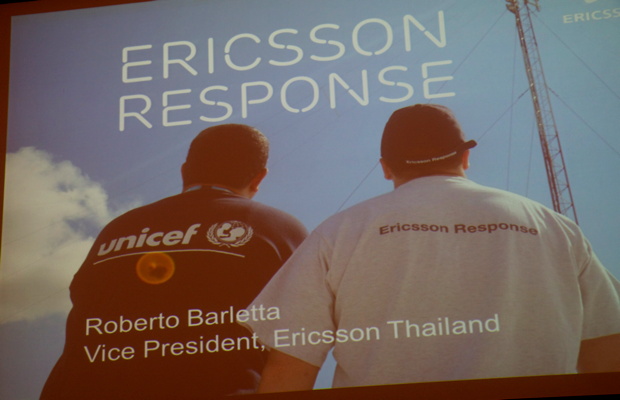
Among those who do contribute to disaster relief with speed is Ericsson Response, a volunteer initiative that supports UN and humanitarian workers with emergency telecoms support, which was introduced by Roberto Munoz. 140 specially trained employees provide communications expertise, equipment and resources to assist humanitarian relief organizations in responding faster and more effectively when disaster strikes, such as in the aftermath of the 2014 typhoon in the Philippines.
As for making the disaster-prone Asia Pacific more disaster-resilient the Asian Disaster Prepardness Center (ADPC) has contributed for nearly 30 years. The NGO’s Thailand Director, Dr. Peeranan Towashiraporn highlighted to need for preparing for disasters to come and that history shows that businesses and the private sector are often hit hard. He brought up the latest major flooding in Thailand as example, which resulted in supply chains disruptions and loss of jobs.
“This is one thing one often forgets. The private sector is usually victims but can play an active role in preparedness.”
ADPC started helping businesses to build disaster preparedness and recovery planning after the latest flooding.
“We help them to develop business cases and come up with a roadmap to strengthen preparedness and create cross-border linkages. A major disaster may strike in one country but if that country is a transportation hub it will impact other countries.”
Dr. Peeranan also pointed out that businesses are also there to ultimately help communities.
“These businesses have a deeper reach than anyone else.”
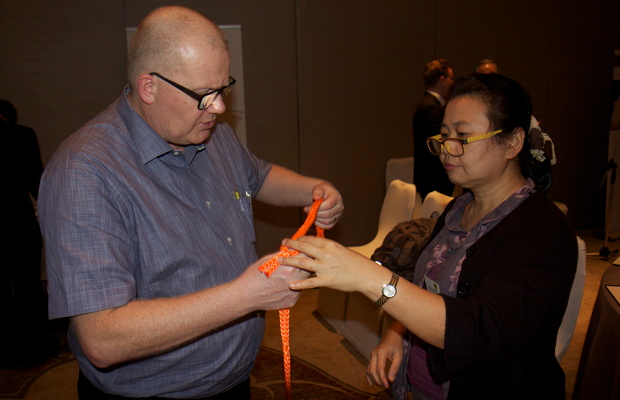
A panel discussion on the strategic approach to private sector engagement came next, where Mr Brian Kelly from the International Organization for Migration highlighted areas where they can work together with the private sector, among tapping into services and products from vendors, such as the Swedish companies.
”Within shelters in this region we do massive procurement, with the vendors that are usually in China and India. But we try to focus on how we can do more local procurement and how we can get international standards to be met. We’d like to see more going into local society.”
Middle income countries that do not require the external assistance, he added.
“I am seeing more and more people as recipients, where the private sector is getting more into delivering to their community.”
The private sector has high capacity in terms of speed, and sometimes volume to set up disaster relief and respond. This region holds excellent opportunities for collaboration with the private sector,” thought Markus Werne.
“Businesses have expertise. On the other hand you [relief organisations] have expertise to plan and coordinate. This is really where the opportunity is,” Dr. Peeranan filled in.
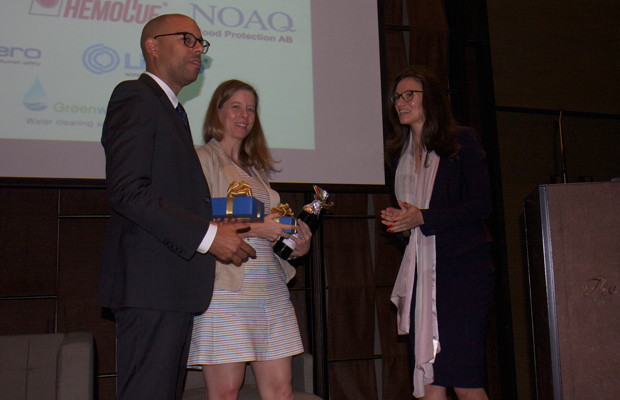
This was followed by ‘Lessons learned and experiences gained in private sector engagements in emergency response’, and a panel discussion on challenges and key successes factors.
A United Nations Office for Disaster Risk Reduction representative brought up that sustainable resilient development is crucial in 2015, with a new framework that reduces disaster risk.
“The impact of those disasters depends on societies and how we build our societies.”
United Nations partners with the private sector because 75 per cent or more of GDP is controlled by it and with disasters being an actual issue!
“Disaster risk management is simply good business; to be exposed but not vulnerable!”
Dominique Pierre Plateau from Save the Children recommended vendors to start a dialogue first before doing any large investment as a company!
“Fellows from companies come to work with us. They may see a business that could require a lot of investment. Look at your company’s core values and what you want to investigate further, but also by opening up a discussion about your products, thinking out of the box, you might end up with a completely new product as a low cost version.”
The following Swedish companies attended the delegation: CybAero, Pitchup, Runlock, Noaq, Fuvido, Lindab, Aircontainer, and HemoCue.
